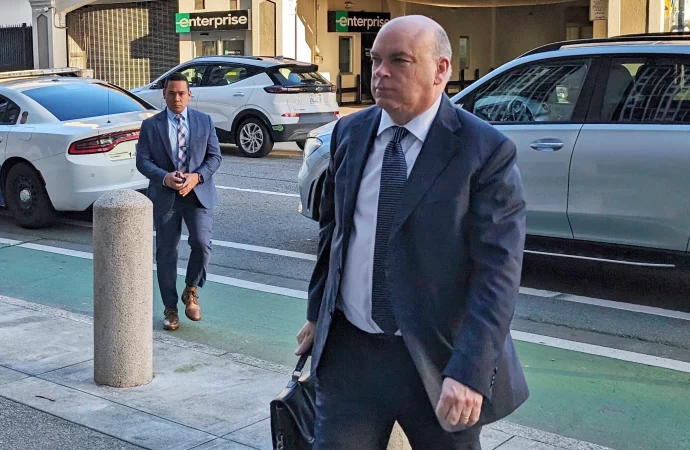In a significant turn of events, Mike Lynch, the former CEO of Autonomy, has been acquitted of fraud charges in a US trial. This trial, which has drawn considerable attention due to its implications for the tech industry and corporate governance, concluded with a verdict that clears Lynch of allegations that he engaged in fraudulent
In a significant turn of events, Mike Lynch, the former CEO of Autonomy, has been acquitted of fraud charges in a US trial. This trial, which has drawn considerable attention due to its implications for the tech industry and corporate governance, concluded with a verdict that clears Lynch of allegations that he engaged in fraudulent activities related to the sale of his company to Hewlett-Packard (HP) in 2011.
Background of the Case
Mike Lynch, a prominent figure in the tech industry, co-founded Autonomy, a British software company specializing in data management and analytics. In 2011, HP acquired Autonomy for $11.7 billion, aiming to enhance its software offerings. However, within a year, HP wrote down the value of Autonomy by $8.8 billion, citing serious accounting irregularities.
HP accused Lynch and his associates of inflating Autonomy’s revenue and profits, misleading investors and HP about the company’s true financial health. This led to multiple lawsuits, including civil and criminal charges in both the UK and the US.
The US Fraud Trial
The US trial centered on accusations that Lynch had deliberately misled HP by overstating Autonomy’s financial performance through various accounting maneuvers. Prosecutors alleged that Lynch and his colleagues used aggressive accounting practices to create a false impression of growth and profitability, thereby inflating Autonomy’s value ahead of the sale.
Lynch’s defense argued that the discrepancies were due to differing accounting standards between the US and the UK, and that HP had mismanaged the integration of Autonomy, leading to its eventual write-down. They maintained that Lynch had acted in good faith and that the prosecution had failed to prove intent to defraud.
Key Evidence and Arguments
The prosecution’s case relied heavily on internal emails and financial documents that they claimed showed Lynch’s intent to deceive HP. They pointed to transactions that seemed designed to boost short-term revenues and mask the true state of the company’s finances.
The defense countered by highlighting expert testimony on the differences in accounting practices and the challenges of integrating a large acquisition like Autonomy. They also underscored the absence of a clear motive for Lynch to engage in fraud, arguing that his substantial personal stake in the company’s success made deliberate deception unlikely.
The Verdict
After weeks of testimony and deliberation, the jury found Mike Lynch not guilty of the fraud charges. The verdict was seen as a vindication for Lynch, who has consistently denied any wrongdoing. It also raised questions about HP’s handling of the Autonomy acquisition and its subsequent allegations.
The acquittal does not mark the end of Lynch’s legal battles, however. He still faces extradition proceedings to the UK, where he is charged with similar offenses. The outcome of these proceedings remains uncertain and could have significant implications for Lynch and the broader business community.
Analysis Table
| Aspect | Prosecution’s Claim | Defense’s Argument | Verdict Reasoning |
|---|---|---|---|
| Accounting Practices | Manipulated to inflate revenue and profits | Differences in US and UK accounting standards | Insufficient evidence of intent to defraud |
| Motive | Personal gain through inflated sale price | Significant personal stake in company success | No clear motive established |
| Integration Issues | Blamed on Lynch’s deceit | HP’s mismanagement of acquisition | Evidence supported defense’s claims |
| Internal Communications | Indicated knowledge of fraud | Misinterpreted, standard business practice | Lack of conclusive proof |
| Expert Testimonies | Supported prosecution’s financial analysis | Highlighted accounting standards differences | Defense’s experts deemed more credible |
Comparative Table: US vs UK Legal Proceedings
| Feature | US Fraud Trial | UK Legal Proceedings |
|---|---|---|
| Jurisdiction | US Federal Court | UK Court System |
| Charges | Fraud, misleading investors | Fraud, false accounting |
| Key Evidence | Emails, financial documents, expert testimony | Financial records, emails, witness testimonies |
| Legal Standards | US federal fraud statutes | UK fraud and accounting laws |
| Defense Strategy | Accounting standards differences, lack of motive | Similar strategy likely, emphasizing UK standards |
| Outcome | Acquitted | Pending |
| Impact | Major implications for tech and corporate governance | Potential extradition, further legal ramifications |
Implications for Corporate Governance
The acquittal of Mike Lynch has significant implications for corporate governance and the tech industry. It highlights the complexities of cross-border acquisitions and the challenges in aligning accounting standards and practices. The case underscores the importance of thorough due diligence and the potential pitfalls of integrating large-scale acquisitions.
For companies, this verdict serves as a reminder of the need for transparency and adherence to robust accounting practices. It also emphasizes the importance of clear communication and documentation during mergers and acquisitions to avoid misunderstandings and potential legal issues.
Future Legal and Business Landscape
While Lynch’s acquittal resolves one aspect of this long-running saga, the upcoming legal proceedings in the UK will continue to keep this case in the spotlight. The outcome of these proceedings could influence future regulatory approaches and enforcement actions in both the US and the UK.
Moreover, this case may prompt businesses to re-evaluate their compliance and governance frameworks, especially in the context of international transactions. Companies may need to invest more in ensuring that their accounting and reporting practices meet the highest standards to avoid similar legal challenges.
Conclusion
Mike Lynch’s acquittal in the US fraud trial marks a significant development in a case that has captivated the business world. While it provides a degree of closure, it also opens up new questions about corporate governance, legal standards, and the handling of cross-border transactions. As Lynch prepares for his defense in the UK, the business community will be watching closely, aware that the implications of this case extend far beyond the individuals involved.
The lessons from this trial are clear: transparency, thorough due diligence, and adherence to robust accounting standards are critical in today’s complex global business environment.

















